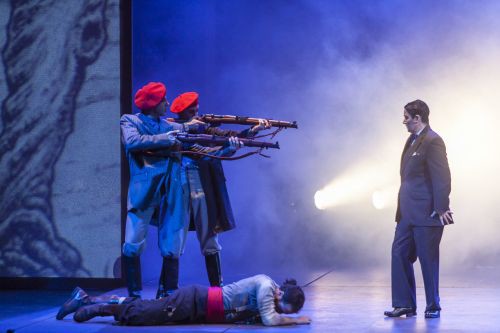 Spain Golijov: Aadamar, Orchestra Principado de Asturias, Chorus Opera Oviedo, Corrado Rovaris (conductor), inTeatro Campoamor, Oviedo, 10.12.2013 (JMI)
Spain Golijov: Aadamar, Orchestra Principado de Asturias, Chorus Opera Oviedo, Corrado Rovaris (conductor), inTeatro Campoamor, Oviedo, 10.12.2013 (JMI)
Cast:
Margarita Xirgú: María Hinojosa
Federico García Lorca: Marina Pardo
Nuria: Elena Sancho-Pereg
Ruiz Alonso: Alfredo Tejada
Tripaldi: Francisco Crespo
Teacher: Pablo Gálvez
Torero: Marc Sala
Co-production of Opera Oviedo, Granada Internacional Festival, Santander Festival
Direction: Luis de Tavira
Sets and Lighting: Philippe Armand
Costumes: Tolita and Maria Figueroa
Videos: Julián de Tavira
Choreography: Stella Arauzo
A year and a half ago I had the occasion to see this opera at Madrid’s Teatro Real, and I wrote that I found it a work better suited to an opera festival than a regular opera season. In fact, its world premiere took place at Tanglewood, and subsequent revisions were made during performances in Los Angeles (but not during the opera season) and at the Santa Fe Festival. The decision of Teatro Real to offer Ainadamar in the regular season was surprising, and this is even more so in the case of Oviedo, which presents few operas outside of the main repertoire. I am not against it, but I do wonder what Oviedo’s subscribers think of this, as I wondered about Madrid’s subscribers.
Ainadamar (“Fountain of Tears” in Arabic) refers to the place where the poet Federico García Lorca was assassinated during the Spanish Civil War. The opera presents Lorca’s death in a well-wrought parallel with that of Mariana Pineda, who is present in a good part of the opera. In the last scene, the protagonist is the great actress Margarita Xirgú, friend of Lorca’s and a frequent star in his plays, including Mariana Pineda. Both Pineda and Lorca are portrayed as martyrs of freedom in life and death. There’s no doubt these two figures are truly universal icons who give meaning and strength to the opera.
Osvaldo Golijov’s music is somewhat irregular, but this is not one of those works that traditional opera lovers reject. It’s not an exceptional work but one can enjoy it, although it lacks a real personal touch by the author. The version in Oviedo eliminates verses by Lorca that were added in Madrid and thus returns to the more traditional Santa Fe version.
The stage production is by Luis de Tavira. I found his work attractive in its simplicity, except in the last scene where one doesn’t know exactly what is going on as Lorca and Xirgú preside over a kind of Christ’s Last Supper. Video projections play an important role, and the choreography is excellent. The sets are rather simple, consisting of black mobile panels that allow much flexibility in the scene changes, but the costumes are no more than adequate. I should mention the excellent performance by the Antonio Gadés dance company.
Musical direction was in the hands of Corrado Rovaris, who led the opera’s Spanish premiere in Granada, and conducted it in 2009 in Philadelphia at the Curtis Institute (incidentally, this was also outside Philadelphia’s regular opera season). Clearly, Oviedo decided to put the opera in safe hands, and the result was impressive. Rovaris offered a remarkable reading, careful and truly delicate.
The casting left something to be desired, but one must acknowledge the difficulties in getting major voices for an opera like this.
María Hinojosa was insufficient as Margarita Xirgú, with a very small middle range that barely reached the audience. Neither was Marina Pardo, with a not very exciting voice, convincing in the character of Federico García Lorca. Elena Sancho Pereg showed an attractive and well handled voice in the part of Nuria, although she was short of volume. Possibly the best vocal performance came from cantaor Alfredo Tejada as Ruiz Alonso .
Teatro Campoamor was at about 70% of capacity. The audience was rather cold at the final bows.
José Mª. Irurzun
